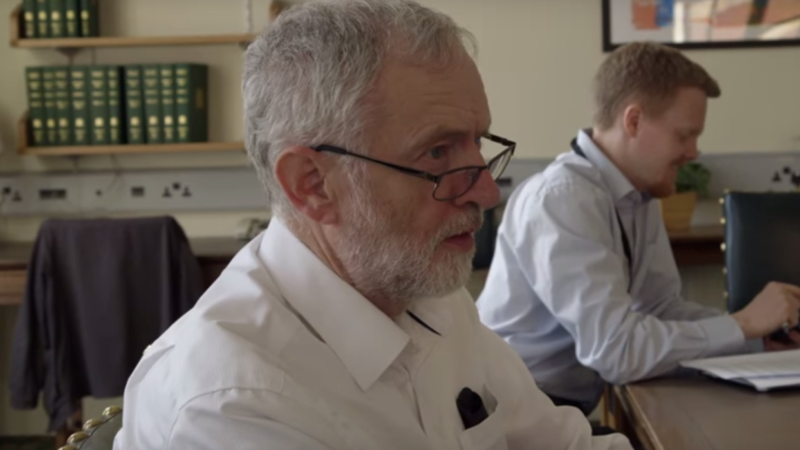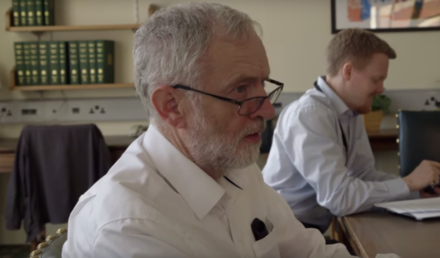

Leading politicians – and their advisors – spend a significant amount of time wrangling with their counterparts in the media. What is far more unusual, however, is those same politicians allowing themselves to be filmed doing so and at times when they are under great pressure. But Jeremy Corbyn has made a habit of doing things differently.
These tantalising glimpses behind the scenes make for fascinating viewing, showing the daily pleasures and frustrations of working for someone in the public eye. Jeremy Corbyn: The Outsider is good to watch but is it good for Labour?
Taking in prep for PMQs, the suggestion of a leak from the senior team, and Corbyn’s own anger at what he claims is the BBC’s “obsession with trying to damage the leadership of the Labour party”, the film gives an insight into the pressures facing any Labour leader, as well as those unique to this one.
What is debatable, however, is whether allowing Vice News – a lesser-known production company – to film over eight weeks has really helped Corbyn.
There was no clear message from the film beyond Corbyn’s hostile attitude towards the BBC and a Guardian columnist who wrote about anti-Semitism – but this would not be what you want the public to take away from 30 minutes up close with the Labour leader.
It was confirmation, if any were needed, that Corbyn and his staff do not attempt to stage manage his interventions in the microscopic manner that initially proved so successful under New Labour.
That is a perfectly reasonable stance to take but should they be openly exhibiting their dislike of some of the reporters and commentators with whom they have to deal every week?
The tone of the BBC’s coverage is unlikely to shift anytime soon. And then there is the question of letting the cameras in to your inner sanctum. As someone who handled media relations for a shadow Cabinet minister then I would not have wanted my regular grumbling or mistakes – the mistakes made by any human being at work – to be captured on film forever.
And, because things can go wrong for any party leader at any time, was it wise to allow Vice to record the behind-the-scenes prep for a Corbyn speech in the Commons?
When Corbyn was filmed practising his response to David Cameron’s statement on the refugee crisis, soon after the chaotic Budget which prompted the resignation of Iain Duncan Smith, he sounded thoughtful. We know Corbyn’s concern for the plight of refugees is not borne out of political convenience but is entirely genuine. So when his speech was subsequently panned by Labour MPs and elements of the media it is unfortunate that the crew from Vice was in the room. The disappointment in Ben Ferguson, the documentary maker and Labour member who voted for Corbyn, is palpable.
“Things just went a bit awkward in there and we have been pretty much asked to leave for the day,” he sighed.
This, of course, is the risk you take in co-operating with a documentary. There is a precedent for Corbyn, however, in the unlikely form of Alastair Campbell and Tony Blair, who were filmed for News from Number 10 in 2000. Campbell gambled that the risks in allowing himself to be filmed would be outweighed by the benefits of exposing the cynicism of the lobby and disproving some of the myths surrounding new Labour “spin”. To a certain extent he was proved right because Michael Cockerell’s documentary failed to land a significant blow on Campbell.
Campbell went into that documentary with a clear agenda but it seems unclear whether Corbyn’s team had a similar game plan for dealing with Vice News. It was an opportunity to attempt any one of of a number of things, such as to explain the phenomenon of Corbynism, how thousands of young people fell in love with a 66-year-old bearded socialist last summer, or to show the origins of Corbyn’s empathy for a series of socially just causes.
Instead, the film concludes with the local elections. In a moment towards the end, Corbyn told Ferguson he felt “very tired” after a late night on polling day. It’s how we would all feel after working for such long hours – but it doesn’t convey the energy required in an election-winner, whether they are standing to run Labour or to rule Britain.
Meanwhile the public are still getting to know Corbyn and are being fed lurid and sometimes false headlines. In the absence of a defining message it was left to the documentary-maker to deliver his own verdict on the astonishing rise and reign at the top of the Labour Party: “He will have to find a wider audience to win a general election and deliver the alternative he represents.”




More from LabourList
Josh Simons resigns as Cabinet Office minister amid investigation
‘After years of cuts, Labour’s local government settlement begins to put things right’
‘The Sherriff of Wild Westminster: what must change in elections bill’